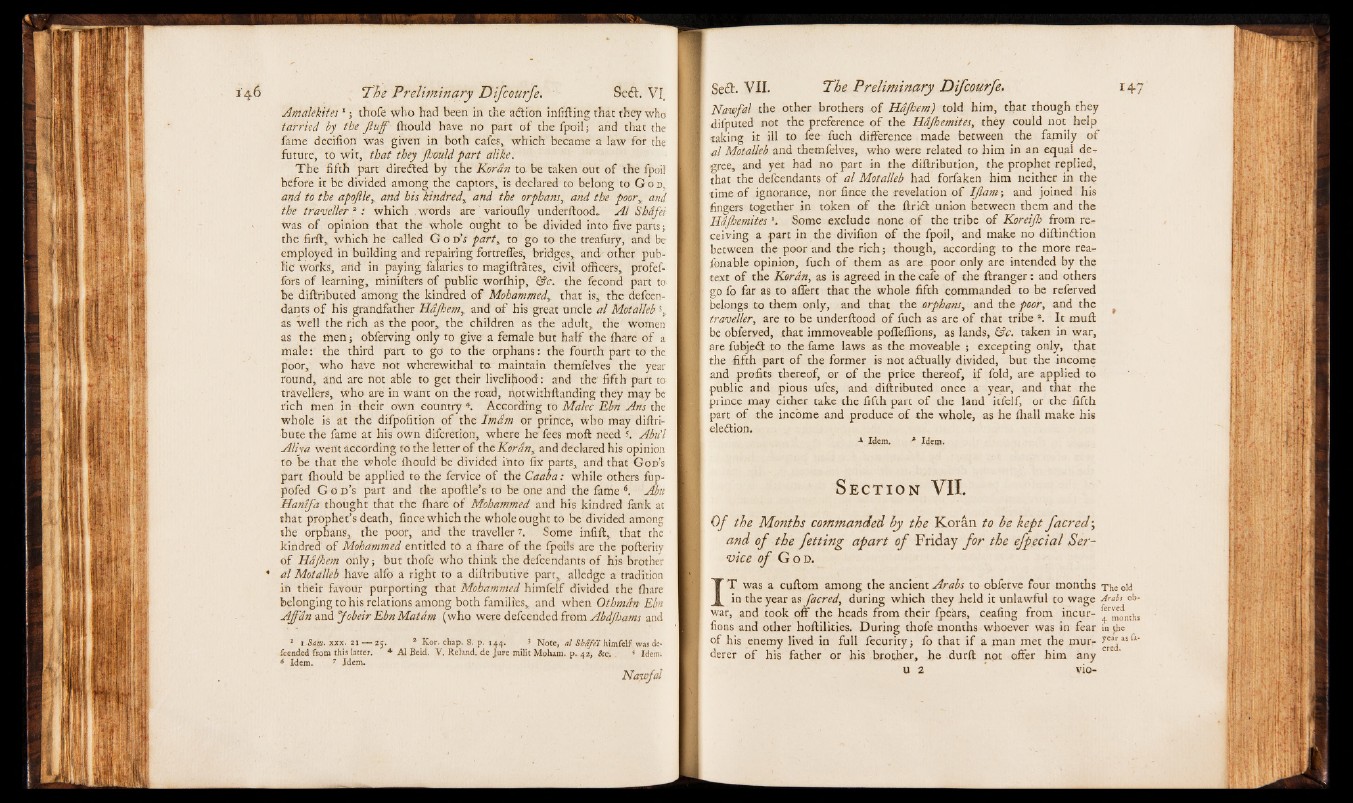
Amalekites1 ; thofe w h o had been in the a d ion infixing that they who
tarried by the flu ff fhould have no part o f the fpoil; and that the
fame decifion was given in both cafes, w hich became a law for the
future, to w it , that they fljouldpart alike.
T h e fifth part directed by the Koran to be taken out o f the fpoil
before it be divided among the Captors* is declared to belong to G od,
and to the apoflle, and his kindred, and the orphans, and the poor, and
the traveller z : w h ich words are varioofly underftood- A t Shdfet
■ was o f opinion that the whole ought to be divided into five parts;
the firft, w hich he called G o v's part, to go to the treafury, and be
employed in building and repairing fortreffes', bridges, and other public
works, and in paying falaries to magiftrates, civil officers, profef-
fors o f learning, mirrifters o f public worffiip, &c. the fecond part to
be diftributed among the kindred o f Mohammed,, that is,, the d e fen dants
o f his grandfather Hajhem, and o f his great uncle al Motalleb 3,
as well the rich as the poor, the children as the adult, the women
as the m en ; obferving only to give a female but h a lf the fhare o f a
m a le : the third part to go to the orphans: the fourth part to the
poor, who have not wherewithal to maintain themfelves the year
round, and are not able to get their livelihood: and the fifth part to
travellers, who are in want on the road, nptwithftanding they may be
rich men in their own country 4. According to Malec Ebn Ans the
whole is at the difpofition o f the Imdm or prince, who may diftri-
bute the fame at his own difcretion, where he fees moft need s. Abu'l
Aliya went according to the letter o f the Koran, and declared his opinion
to be that the whole fhould be divided into fix parts, and that G od’s
part fhould be applied to the fervice o f the Caaba: w hile others fup-
pofed G o d’s part and the apoftle’s to be one and the fame 6. Abu
Hantfa thought that the fhare o f Mohammed and his kindred fank at
that prophet’s death, fince w hich the whole ought to be divided among
the orphans, the poor, and the traveller7. Some in fill, that the
kindred o f Mohammed entitled to a fhare o f the fpurils are the pofterity
o f Hajhem only; but thofe who think the defendants o f his brother
* al Motalleb have alfo a right to a diftributive part, alledge a tradition
in their favour purporting that Mohammed himfclf divided the fhare
belonging to his relations among both families, and when Othmdn Ebn
Affdn and Jobeir Ebn Mat dm (who were d efend ed from Abdfloams and 1
1 1 Sam- xxx. 21 — 2;. a Kor. chap. 8. p. 144. 3 Note, al SbSfti himfelf was defcended
from this latter. * Al Beid. V. Reland, de Jure milit Moham. p. 42, &c. . * Idem.
6 Idem.. 7 Idem.
Napfal
Naïef al the other brothers of Hajhem) told him, that though they
dilputed not the preference of the HaJhemites, they could not help
taking it ill to fee fuch difference made between the family of
al Motalleb and themfelves, who were related to him in an equal degree,
and yet had no part in the diftribution, the prophet replied,
that the defendants of al Motalleb had forfaken him neither in the
time of ignorance, nor firtce the revelation of Iflam-, and joined his
fingers together in token of the ftridt union between them and the
HaJhemites Some exclude none of the tribe of Koreijh from receiving
a .part in the divifion of the fpoil, and make no diftindtion
between the poor and the rich ; though, according to the more rea-
fonable opinion, fuch of them as are poor only are intended by the
text of the Koran, as is agreed in the cafe of the ftranger : and others
go fo far as to affert that the whole fifth commanded to be r e f rved
belongs to them only, and that the orphans, and the poor, and the
traveller, are to be underftood of fuch as are of that tribe z. It muff
be obferved, that immoveable poffeffions, as lands, & c. taken in war,
are fubjedt to the fame laws as the moveable ; excepting only, that
the fifth part of the former is not a dually divided, but the income
and profits thereof, or of the price thereof, if fold, are applied to
public and pious ufes, and diftributed once a year, and that the
prince may either take the fifth part of the land itfelf, or the fifth
part of the income and produce of the whole, as he fliall make his
eledtion.
Idem. À Idem.
S e c t i o n VII.
O f the Months commanded by the Koran to be kept facred-,
and of the fetting apart o f Friday fo r the efpecial Service
o f G od.
IT was a cuftom among the ancient Arabs to obferve four months The old
in the year as facred, during which they held it unlawful to wage Arabs ob-
war, and took off the heads from their fpears, ceafing from incur- ^r^onths
lions and other hoftilities. During th o f months whoever was in fear in jhe
of his enemy lived in full fecurity; fo that if a man met the mur- as
derer of his father or his brother, he durft not offer him any
u 2 vio